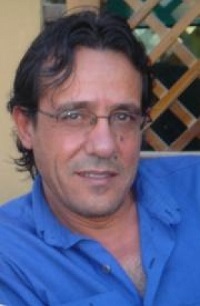The Silence that Remains - OUT OF PRINT

Ghassan Zaqtan is one of the most original and compelling Palestinian poets of his generation. A novelist, editor, playwright and filmmaker, he has written ten books of poetry, including Like a Straw Bird It Follows Me, awarded the Griffin International Poetry Prize in 2013. The Silence that Remains introduces readers in the UK for the first time to Zaqtan’s early work, including his debut collection destroyed during the Israeli invasion of Lebanon in 1982. Writing about personal memory as a form of political and social activism, while avoiding the mythology of exile and displacement, Ghassan creates an aesthetic of fragments, an imaginative archaeology of fragile human subjects. It’s a book about the silence of the tongue and the silence of the heart, the silence of resistance and the resistance of silence.
Front cover: Mona Hatoum, Remains of the Day (detail) 2017, wire mesh and wood.
Installation view at Hiroshima City Museum of Contemporary Art. © Mona Hatoum. Courtesy Hiroshima City Museum of Contemporary Art (Photo: Ken Kusakari)
Sample Poems
Blind
Where do you go when houses when roads put their lights out when I walk like a gesture from the past alone in the whispering at forty Where do I go when I exit memory’s icon when summoned in a land of jinn happy or wandering like a sound or a blind man creeping about the place
Follow That Smell
Follow that smell, hyena
follow that smell
alone and spotted and roving
as if you didn’t know
and laugh in rugged valleys
whose rocks are sallow then black
Follow it, hyena
follow your murderers to their low windows
and with your two lanterns pass through their sleep,
exchange their bodies with your scent
With their placid trickery push them toward the night
dizzy and stumbling in their slumber
Follow that smell, hyena
you laughing
father
of ours
in the valleys
Karameh 1965
The ripple that kept rising since childhood from the direction of the river where the hills come down to the water when we sleep where the fields get up at night after dinner and climb to the convent the ripple I used to hear, mysterious, as it climbed toward Karameh and Salt where the dogs barked to no avail the ripple that used to stroll those corners and crawl under planks, houses, and hay is following me again... We are now in Tunis and horses are galloping toward the rock of forty years while in the remotest memory those stubborn dogs bark in the courtyard
Damascus 1986
The key’s clang the sun I called from the windowsill the brief time of fondness none of it was mine This cramped morning sprinkled over the neighbour’s garden from the edge of the pillow isn’t mine It wasn’t mine that laugh of the girl who gleamed behind the vase in air There had to be a hand picking jasmine nearby If only our neighbour would turn off the radio I could hear how water breaks over her hands as she washes . . . I would have opened the window I would have turned off the lights
Tunis 1992
Here is the house a glass front and a reed door A darkness in the corridor a lemon that has just blossomed two days ago Almond trees on both sides a waterless hookah will spot us as soon as the three of us enter The garden’s shadow walks behind me and the jasmine scent I’ll sit where I used to sit the garden’s shadow over the mat the jasmine smell on a dress A summer dress early summer the dress of the girl I didn’t love
Birzeit 1998
A crying boy that boy of our Christian neighbour’s he’d break the hoopoe’s branch on a pine tree then cry Hay needles fly after him and sting him feathers and birds and bees are after him as he runs under the window a crooked pine tree follows him and the boy is running toward the street and crying crying surrounds him and propels him and the crying boy is running toward the junkyards while the junkyard snake, the rattling kind, hearkens, alert to all of this in Birzeit
A Scream over the Woods
In the dark there’s room for a black hand with five fingers and an arm In the dark a house is consumed with the chores of its dead who are consumed with transferring their intentions to the arch In the dark ruined voices, screams that remained on rocks and in nettle fences and in the courtyard’s water Like rough bark a scream appears over the woods In the dark where the past roams around the ladder folded like a cold shirt the hearts of the dead stumble and the rustle of their stroll in the hallway is like a blind plant or a pair of consenting eyes The ladder goes on leaning alone toward a whiteness the arches diminish and no time is enough for them no time and let down they hold their intentions white their solitude within them... Did we cross someone’s mind before we rose in the dark stung with our image white from sleep’s effect while arches branched out of us haggard and grew faint in the hallways? Who thought of us? we the forgotten who boarded vehicles to exile and returned forgotten without vehicles
Vehicles in the Dark
The night traveller won’t see a hand that points to a low south in the shadow or a road of white shrouds and blue mats Dad, wake your children up and leave your slanted shoulders by the window, your gait on the flanks of summer has a rustle of awesome sorrow Wake your children up, Dad, dream will sway with them, a tambourine will tap down the slope at exactly ten o’clock And a pack of wolves will ascend its far dark edge



